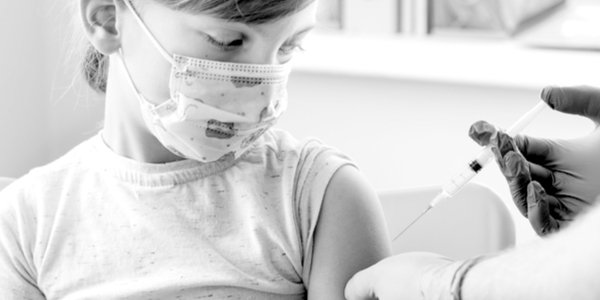AMERICA’S public health agency is continuing to recommend covid jabs to children under four, despite its own study showing that Pfizer vaccinated children are significantly more likely to catch covid than unvaccinated children. In the UK, no children in this age group died of covid before vaccination was introduced but 64 died after it became available to them.
The US research, carried out between 2022 and 2023 in the Omicron variant period, shows that vaccinated children are 159 per cent – 1.5 times – more like to be infected with the SARS-CoV-2 virus, and 257 per cent – 2.5 times – more likely to develop symptomatic covid-19 than their unvaccinated peers if they received Pfizer-BioNTech’s covid-19 vaccine.
It also shows that children who caught covid-19 were less likely to suffer a repeat infection.
Time made no difference, immunity did not wear off, and children enjoyed long-lasting immunity regardless of when the infection had occurred.
Despite the percentages, and the evidence that infection offered robust protection, the team of 35 authors concluded that children should still receive the jab. They said: ‘Covid-19 vaccines are recommended to reduce severe illness, hospitalisation and death.’ But if children are less likely to catch covid if they are unvaccinated, this makes little sense.
The scientists came to this conclusion after analysing children who had recovered from covid infection and had also received a covid vaccine. Children who had already been infected with covid, before getting the Pfizer-BioNTech vaccine, were less likely to get reinfected after vaccination, they said.
But, if children are less likely to become infected with SARS-CoV-2 and develop covid if they are unvaccinated, why would parents risk the side effects of the Pfizer vaccination even if, as the researchers say, natural infection plus Pfizer’s jab offer more protection?
Serious adverse events post Pfizer include anaphylaxis (an allergic reaction which is potentially fatal, causes difficulty in breathing and swelling around the eyes and lips) and myocarditis and pericarditis, (inflammation of the heart muscle and the lining around the heart) also potentially fatal. The two heart conditions are more likely to affect older children than under-fives but are still a recognised risk. Both adverse events are rated as ‘very uncommon’, affecting between 1 in 10,000 to 1 in 100,000 children.
By September 2023, around 40 post-vaccine deaths in under-fives had been reported to the US Vaccine Adverse Event Reporting System (VAERS). By the same date, around 1,000 under-five covid deaths had been reported, mostly in children with pre-existing health conditions and comorbidities. It is not specified if healthy children, with no co-morbidities, died of covid.
In the UK, Office for National Statistics figures from January 2020 to July 2023 show that under-five deaths with covid or because of covid were rare, with no deaths recorded before covid vaccination was introduced. Vulnerable children, between six months and five years, were offered the vaccine from June 2021. Post jab rollout, 37 deaths in the under-one year age group were recorded, the first in July 2021. In the one-to-five-year age group, 27 deaths were recorded, the first in September 2021 and the last in March 2022.
Our drugs watchdog is the Medicines and Healthcare products Regulatory Agency (MHRA). They run the Yellow Card Scheme that collates reports of injury and death post-covid-19 vaccination. The MHRA has eight reports of deaths in under-fives post-vaccination. Their last summary included figures to May 20, 2024, and says they recorded 451 fatalities of ‘unknown age’ and that 46,915 serious adverse event reports are also of ‘unknown age’.
The peer-reviewed US study, published in the Journal of the Pediatric Infectious Diseases Society,was produced by scientists at the Centers for Disease Control and Prevention (CDC) and Baylor College of Medicine, Texas. Oxford Academic are the journal’s publishers. The study was partly funded by the agency formerly run by Dr Anthony Fauci, the National Institute of Allergy and Infectious Diseases (NIAID), plus the US National Institutes of Health (NIH) and the US Department of Health and Human Services (DHHS).
Given the origins of the study, the scientists’ conclusion is not surprising, despite all evidence to the contrary. They said: ‘Covid-19 vaccines are recommended to reduce severe illness; the overall risk of infection may not differ substantially between vaccinated and unvaccinated naïve children under five years.’ They are basically saying there is little difference in infection rates between vaccinated and unvaccinated children under five, although their Pfizer numbers show the opposite.











